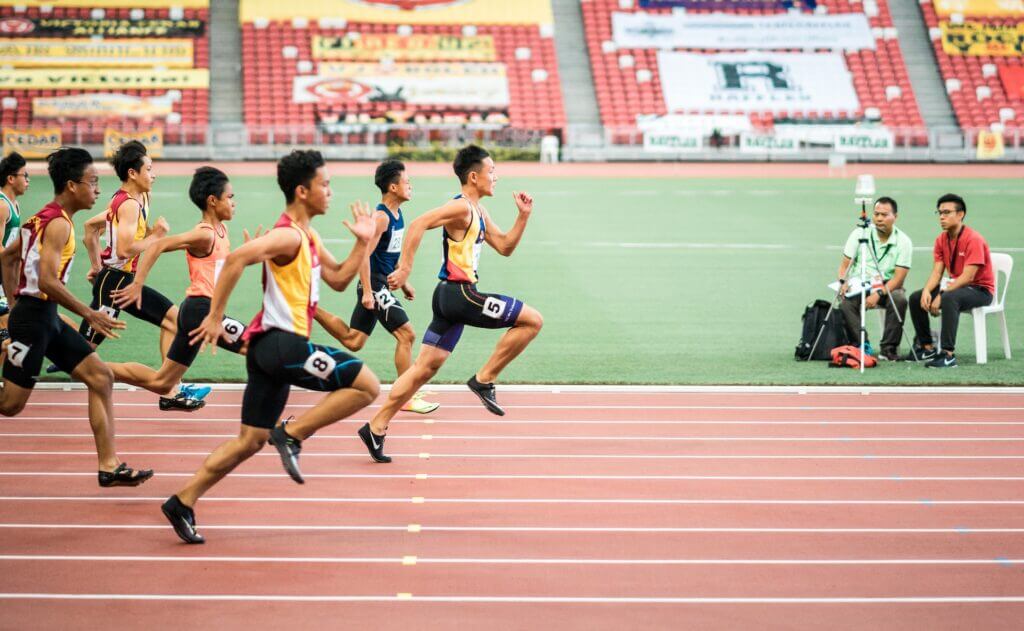Picture yourself standing at the starting line, fueled by anticipation and determination. You’re about to embark on a thrilling 200 meter sprint, but do you know what time you should aim for? Wonder no more! In this blog post, we’ll unravel the mystery of the average 200 meter time.
So, what’s the average 200 meter time? The average 200 meter time varies widely based on factors like age, training, and genetics. Here are approximate averages:
- Men: Around 24-26 seconds for an average adult male.
- Women: Typically between 28-32 seconds for an average adult female.
- High School Boys: Roughly 23-26 seconds for a competitive high school male athlete.
- High School Girls: Generally around 26-30 seconds for a competitive high school female athlete.
Whether you’re an athlete craving improvement or simply intrigued by your own speed, we’ll explore the factors that influence this feat and offer valuable tips to help you conquer the track. Get ready to embrace the exhilaration of the 200 meter dash and unleash your true potential!
Table of Contents
Factors Influencing Your 200 Meter Time

When it comes to the 200 meter sprint, several factors come into play that can affect your time on the track. Let’s explore these factors and see how they impact your performance:
1. Genetics
It’s true, your genetic makeup can play a role in your sprinting ability. Some individuals are naturally blessed with a higher proportion of fast-twitch muscle fibers, which are essential for explosive speed. However, don’t be disheartened if you don’t have sprinter genes. With the right training and dedication, you can still improve your 200 meter time.
2. Training and Conditioning
The effort you put into your training directly influences your performance. Regular practice, speed workouts, and specific drills tailored to improve your sprinting technique can make a significant difference. By focusing on building strength, power, and endurance, you’ll enhance your overall speed and efficiency.
3. Technique and Form
Proper running technique and form can shave precious seconds off your time. Maintaining an upright posture, driving your knees, pumping your arms, and striking the ground with a mid-foot or forefoot strike are key elements to optimize your stride and maximize speed.
4. Starting Acceleration
The start of the race sets the tone for your overall performance. A strong and explosive start, with a powerful drive phase and quick transition to an upright sprinting position, can give you an advantage. Practice your starts to improve your acceleration and gain an edge over your competitors.
5. Endurance and Speed Endurance
The ability to maintain speed over the entire 200 meters is crucial. Building endurance through longer runs and incorporating speed endurance workouts, such as interval training, will help you sustain your pace throughout the race.
6. Mental Focus
Your mindset plays a significant role in sprinting. Staying focused, blocking out distractions, and maintaining a positive attitude can boost your performance. Visualizing success and setting achievable goals can also help you push through fatigue and achieve your best time.
By understanding these influential factors and working on improving each one, you can make substantial strides in your 200 meter performance.
Remember, every little adjustment counts, so focus on the details, train consistently, and unleash your full potential on the track!
Read: Average 8 mile run time by age
Average 200 Meter Time By Age and Sex

If you’re curious about how your 200 meter time stacks up against others your age and sex, we’ve got you covered. Let’s dive into the average 200 meter times across different age groups and sexes:
| Age Group | Male Average Time (seconds) | Female Average Time (seconds) |
|---|---|---|
| 10-14 | 28-32 | 30-35 |
| 15-19 | 24-28 | 27-32 |
| 20-29 | 23-26 | 26-30 |
| 30-39 | 24-28 | 27-32 |
| 40-49 | 25-29 | 28-33 |
| 50+ | 26-31 | 29-34 |
Example
Let’s say you’re a 16 year old male. On average, a solid 200 meter time for someone in your age group falls between 24 and 28 seconds.
So, whether you’re competing against others or simply aiming to beat your own personal record, understanding the average 200 meter time for your age and sex can give you a helpful frame of reference. Let these numbers inspire and motivate you to push your limits, set new goals, and make your mark on the track.
Read: Average 2 mile run time by age
Average 200 Meter Time By Fitness Levels
After exploring the average 200 meter time by age and gender in the previous section, it’s worthwhile to delve into another aspect of athletic performance: the average 200 meter time by fitness levels.
- Beginners are individuals who are relatively new to athletic training or have a low level of physical activity.
- Intermediate individuals have some experience with training and exercise but may not be highly competitive.
- Advanced athletes have significant training experience and may compete at a high level regionally or nationally.
- Elite athletes represent the pinnacle of performance, competing at the highest levels globally.
Here’s a breakdown of the average 200 meter time by fitness levels, categorized by gender:
For Men:
| Fitness Level | Average 200 Meter Time |
|---|---|
| Beginner | 28-32 seconds |
| Intermediate | 24-28 seconds |
| Advanced | 20-24 seconds |
| Elite | <20 seconds |
For Women:
| Fitness Level | Average 200 Meter Time |
|---|---|
| Beginner | 32-36 seconds |
| Intermediate | 28-32 seconds |
| Advanced | 24-28 seconds |
| Elite | <24 seconds |
Understanding these average times provides a valuable foundation for assessing one’s performance, but the journey doesn’t end there. In the next section, we’ll explore what constitutes a good 200 meter time, building upon the benchmarks established here.
Whether you’re just beginning your sprinting journey or aiming for elite status, recognizing these averages can serve as a springboard for setting and achieving your athletic aspirations.
What Is a Good 200m Time?
Determining what constitutes a good 200 meter time is subjective and depends on individual goals and aspirations.
For most adults aiming for competitive performance, achieving a time between 22 to 26 seconds for men and 26 to 30 seconds for women is considered solid. Similarly, high school athletes typically target times ranging from 21 to 25 seconds for boys and 25 to 28 seconds for girls to excel in their age category.
However, it’s crucial to recognize that what defines a “good” time can vary greatly based on personal objectives.
For instance, someone striving for recreational fitness might be satisfied with a time above these benchmarks, while aspiring competitive athletes may aim to surpass them. Therefore, it’s essential to align your time goals with your individual aspirations and circumstances.
200 Meter World Record
The current world record for the 200 meter sprint stands at 19.19 seconds for men, set by Usain Bolt of Jamaica on August 20, 2009, during the World Championships in Berlin, Germany. For women, the world record is 21.34 seconds, achieved by Florence Griffith-Joyner of the United States on September 29, 1988, at the Seoul Olympic Games.
Now, let’s delve into actionable strategies to help you enhance your 200 meter performance. In the next section, we’ll explore effective methods to improve your speed and efficiency on the track.
Read More: Men’s 200 meter world record progression
How To Improve Your 200 Meter Time ?
Improving your 200 meter time takes dedication and smart training. Here are some practical tips to help you enhance your speed and performance:
1. Interval Training
Incorporate interval training into your workouts. Alternate between sprinting at maximum effort for short distances, like 100 meters, and jogging or walking for recovery.
For example, sprint for 100 meters, then walk or jog for 200 meters, and repeat. This helps build endurance and speed. Aim for 4-6 repetitions per session to build endurance and speed, ultimately surpassing the average 200 meter time.
2. Strength Training
Include strength training exercises in your routine to build muscle power and explosiveness. Focus on exercises like squats, lunges, and plyometrics to strengthen your legs and core.
For instance, perform 3 sets of 10 squats with moderate to heavy weights, ensuring proper form for maximum benefit.
3. Technique Refinement
Work on your sprinting technique to optimize efficiency and speed. Focus on maintaining proper posture, arm movement, and stride length. Practice drills such as high knees, butt kicks, and A-skips to improve your form and stride mechanics.
4. Rest and Recovery
Allow adequate time for rest and recovery between workouts to prevent injury and optimize performance. Aim for at least one or two rest days per week, and prioritize sleep to ensure proper recovery. Adequate rest allows your muscles to repair and grow stronger.
5. Nutrition and Hydration
Fuel your body with proper nutrition and hydration to support your training efforts. Eat a balanced diet rich in carbohydrates, protein, and healthy fats to provide energy and promote muscle recovery. Stay hydrated by drinking plenty of water throughout the day, especially before and after workouts.
By incorporating these tips into your training regimen and staying consistent, you can work towards improving your 200 meter time and reaching your sprinting goals. Remember to track your progress over time and celebrate your achievements along the way!
Final Thoughts
Reflecting on the average 200 meter time, it’s clear that speed in sprinting varies greatly among individuals. While we’ve discussed general benchmarks, such as 22 to 26 seconds for men and 26 to 30 seconds for women, it’s essential to recognize that these numbers are just averages. Every athlete is unique, with different strengths, weaknesses, and potential for improvement.
As we wrap up this discussion, consider delving deeper into the world of sprinting by exploring another fascinating aspect: the average 400 meter time. In our upcoming blog post, we’ll explore the nuances of this longer sprint distance and how it compares to the 200 meter dash. Stay tuned for insights, tips, and strategies to improve your performance and continue pushing your limits on the track.
In the meantime, keep training, stay motivated, and remember that progress takes time and dedication. Whether you’re aiming to surpass the average 200 meter time or conquer new challenges in sprinting, embrace the journey and celebrate every step forward towards your goals.
Frequently Asked Questions
How fast does it take to run 200m?
On average, it takes about 22 to 26 seconds for men and 26 to 30 seconds for women to run 200 meters.
What is the average 200m time for a high school boy?
The average 200 meter time for a competitive high school boy is typically around 23 to 26 seconds.
How fast should a 14 year old girl run 200m?
For a 14 year old girl, a good 200 meter time might range from 28 to 32 seconds.
What is a good 200m time for an 8th grade girl?
A good 200 meter time for an 8th grade girl might fall between 30 to 34 seconds.


